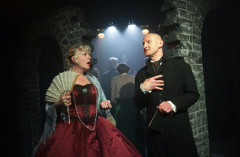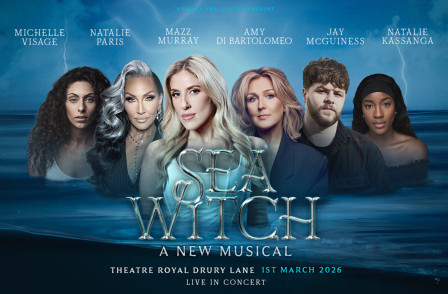Review: AFTER DARK at The Finborough Theatre
 The building of the new Metropolitan line underground railway presents the thrilling opening of Dion Boucicault’s 1880’s melodrama set in the grimy streets of Victorian London. Combining music of the era with a modern design, After Dark may be a world away from the naturalistic style of theatre we’ve come to expect, but there’s plenty of fun to be had with melodrama.
The building of the new Metropolitan line underground railway presents the thrilling opening of Dion Boucicault’s 1880’s melodrama set in the grimy streets of Victorian London. Combining music of the era with a modern design, After Dark may be a world away from the naturalistic style of theatre we’ve come to expect, but there’s plenty of fun to be had with melodrama.
The plot is audaciously complicated and yet somehow, simple and clear, unsubtle but familiar. Refreshing to sit back as no effort is needed to follow to its inevitable, happy conclusion. Eliza, an innocent beauty trapped in a world of deception, has her world turned up-side down when her father descends into a life of destitution. Her beloved beau is deceived by a wicked lawyer and his accomplice, a dodgy music hall madam. The truth is pursued by the hapless constabulary and the chase is on above and below the Thames.
Boucicault (London Assurance, An Octaroon) wrote plays for the working classes to enjoy, while his peers mostly catered for the upper classes. The crushing poverty of the East End, low-lifes frequenting gambling dens and brothels are ornamented here in the Finborough’s production, with perfectly pitched classic songs from old time music hall. Unfashionable for a century, the non-naturalistic flamboyancy and ‘over-acting’ are almost the antithesis of what we have come to expect, so this type of Victorian work needs to be fully embraced in order to work. Combined with some brilliant staging and solid ensemble movement, Phil Willmott’s direction presents us an ensemble who do just that. Two brick arches were used to full advantage creating the shadowy tunnels, porticos and alleyways of Victorian London. Deftly manoeuvred by the ensemble cast they acted as both backdrops for the main action and as frames for detailed tableaus of London life peopled by the other actors. Considering the size of the space Willmott’s dynamic staging managed to create not only the river Thames but a speeding train hurtling into the audience. Hugely effective.
The play really finds its stride by the second act with some glorious performances by Jemima Watling as the wholesome heroine Eliza who narrowly escapes death, and Jazz Sanders as the spoiled ingénue, both striking just the right notes as they walked the delicate line between the comedy and the tragedy that makes this genre come alive. The stereotypical copper, engagingly played by Steven France, struggles to uncover the financial fraud of the plot and in a musical interlude is distracted by a troop of actor muso prostitutes. This trio of actor musos mix comical lyrics with beautiful harmonies, timely discordant rifts and witty, contemporary allusions (no spoilers).
Willmott gets his cast to raise the stakes to the max in a successful exploration of a clearly laughable plot full of traditionally two-dimensional Victorian characters who hit the right formula by combining truthful choices with amplified panache. I liked the lack of pretension and embracing of the Dickensian types – from malignant lawyer to benevolent missionary and am staggered how in such a tiny space this production managed to conjure the hidden corners of Victorian London.
The production is served by superb creative team and the actors are impeccably dressed, as Willmott’s plays always are by Penn O’Gara who here, not only sumptuously captures the period but also uses her signature sense of humour to insert little twists and details. As well as the stirring live music the production is has a superb, simple design which is effortlessly explored to the max. Beautifully designed and executed lighting and sound heightens the dramatic climaxes and somehow a modern audience are transported into the theatre of another century. As much fun as there is to be had, it's a reminder that poverty is as much a problem as it was and remains, heartlessly overlooked.
Latest News

 ROMEO AND JULIET, starring Sadie Sink and Noah Jupe, extends due to popular demand
3 March 2026 at 10:01
ROMEO AND JULIET, starring Sadie Sink and Noah Jupe, extends due to popular demand
3 March 2026 at 10:01

 I'M EVERY WOMAN - THE CHAKA KHAN MUSICAL moves London premiere to Hackney Empire
2 March 2026 at 16:12
I'M EVERY WOMAN - THE CHAKA KHAN MUSICAL moves London premiere to Hackney Empire
2 March 2026 at 16:12

 KINKY BOOTS at London Coliseum - Rehearsal images released
2 March 2026 at 13:57
KINKY BOOTS at London Coliseum - Rehearsal images released
2 March 2026 at 13:57

 Review: SEA WITCH at Theatre Royal Drury Lane
2 March 2026 at 12:07
Review: SEA WITCH at Theatre Royal Drury Lane
2 March 2026 at 12:07
